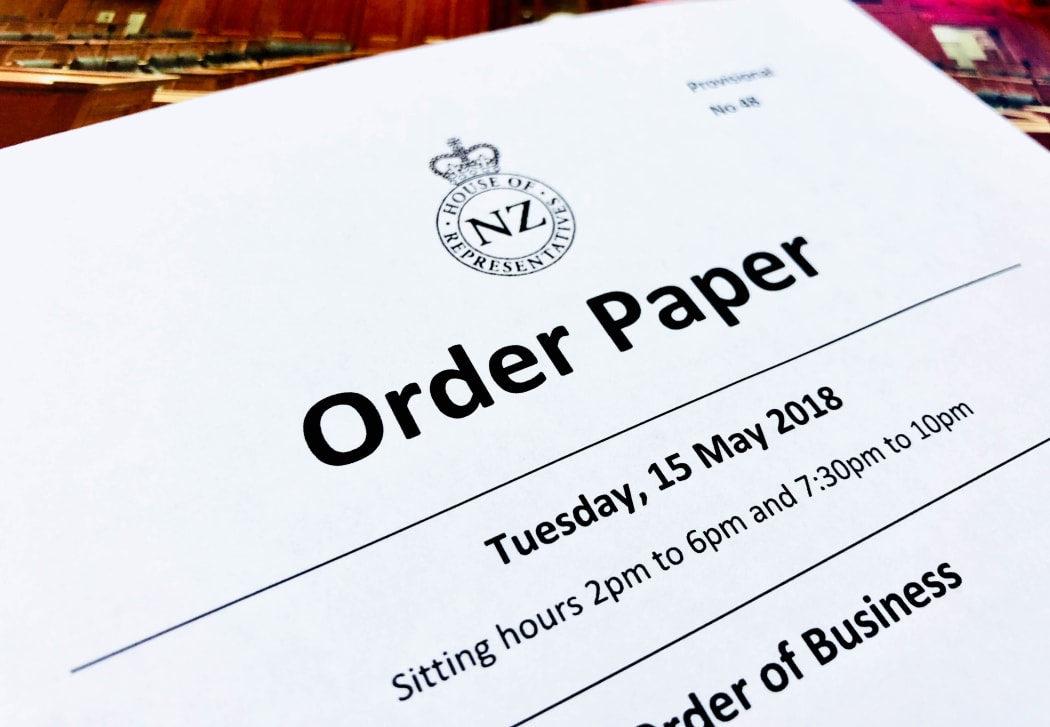It’s budget week! And even though that's not happening until Thursday it's going to soak up most of the attention this week.
There are some other things MPs will do before then though.
The usual back and forth of question time will still happen (except for Thursday because that’s budget day) and MPs will work through “Government orders of the day” on Tuesday, and "Member's orders of the day" on Wednesday, which are just others ways of saying they work through proposed legislation. The plan for this week (May 15 - 17) is below.

Photo: VNP / Daniela Maoate-Cox
MPs are required to be at Parliament for scheduled sitting days, so called because MPs sit in those green leather chairs when they’re in the debating chamber. An agenda known as the Order Paper is published online each sitting day outlining what business the House plans to get through but there are always more items on the list than there is time for. Below is what they’ll attempt to get through.
Budget Day (Thursday - but we know you're keen to hear about it so we've put it first)
What:
-
Thursday is budget day. Yay, break out the champagne. Wait, what is that exactly?
-
The Appropriations (2018/19 Estimates) Bill (a.k.a the budget).
-
There’s no Oral Questions on Thursday, so the budget event can begin at 2pm.
-
Grant Robertson (Minister of Finance) introduces the Appropriations Bill and it is read a first time without debate. Then the Minister delivers a copy of his budget statement to the Speaker, Clerk, PM, other party leaders and Hansard.
-
The Minister of Finance then reads the budget statement (it can take as long as he likes) as part of his speech to move the second reading of the Appropriations Bill.
-
The Budget Debate proper is usually kicked off by the Leader of the Opposition (20 minutes), and followed by the other party leaders: the Prime Minister (Labour, 20 minutes), Deputy Prime Minister (NZ First, 20 minutes), Greens (20 Minutes), ACT (10 Minutes), other MPs (10 minutes each).
Why:
-
Running a country costs money. And the Government needs permission from Parliament both to collect money and to spend it.
-
Budget day is the beginning of a very long parliamentary process of approving the Government’s spending plan for the year from July 1st. It begins the debate on a piece of legislation [the Appropriations (2018/19 Estimates) Bill] which outlines spending on all the many dozens of aspects of the wider ‘government’ - from schools and hospitals, to spies and science; from artificial limbs to environmental protection, and from taxes to lotteries.
-
This first debate will last for 15 hours (until at least the end of next week) and then the various ‘Votes’ (the topic sections of the budget: Health, Education etc) go to various Select Committees to be examined and defended by Ministers before arriving back at the House for 11 hours of Committee Stage (the Appropriations Debate) and a three hour third reading. That’s 29 hours or more of House time plus the many Select Committee meetings.
-
Along with the Appropriations Bill, the Government will also ask Parliament to pass an Imprest Supply measure to actually give it some interim walking-around-money while the House considers the Appropriations.
Weapons Brokering (Tuesday)
What:
-
The third reading of the Brokering (Weapons and Related Items) Controls Bill.
-
The Bill will set up a way to regulate the brokering* of weapons and related items by New Zealanders or NZ based entities overseas particularly where there is a risk of weapons being transferred to “illegitimate users or undesirable destinations” like a conflict zone.
*Brokering involves negotiating, arranging, or facilitating the transfer of weapons and related items from one foreign country to another.
Why:
-
New Zealand ratified the Arms Trade Treaty in 2014 which regulates the international trade in conventional arms (for example rifles, sea mines or bombs) and this Bill will help New Zealand meet its treaty obligations.
Disestablishing the Families Commission (Tuesday)
What:
-
The committee stage is continued for the Families Commission Act Repeal Bill.
-
Repeals the Families Commission Act 2003 and disestablish the Families Commission which operates as Superu.
Why:
-
The Act outlines the Commission’s main functions as advocating for the interests of families and monitoring/evaluating programmes in the social sector. The previous National led Government rejigged agencies and resources to support social investment which included setting up the Social Investment Agency and disestablishing the Families Commission or Superu. Some of the Commission’s functions have already been switched to the Ministry of Justice and the Ministry of Social Development.
Social Security Rewrite (Tuesday)
What:
-
The committee stage of the Social Security Legislation Rewrite Bill
-
This legislation was introduced by the former National-led government. The Select Committee report on this Bill included dissenting opinions from both Labour and the Greens - so the Government introduced Supplementary Order Papers notifying proposed amendments to be made during this stage of the debate.
-
This Bill is planned to be split up at the Committee stage into: a social security bill, a residential care and disability support services bill, and an Artificial Limb Service bill.
Why:
-
This bill would repeal and replace the Social Security Act 1964 and the Social Welfare (Reciprocity Agreements, and New Zealand Artificial Limb Service) Act 1990.
-
The main aim of the bill is listed as: to make New Zealand’s social security law easier to understand by modernising its language, drafting style, and structure.
-
The bill sets out: people’s eligibility for social security benefits, obligations and sanctions, rights to review and appeal decisions, how assistance is delivered to beneficiaries.
Military Justice (Tuesday)
What:
-
The second reading of the Military Justice Legislation Amendment Bill.
-
It will enhance victims’ rights by updating the military justice system and aligning it with the criminal justice system.
-
It’s an omnibus bill which means it amends more than one Act: the Armed Forces Discipline Act 1971, the Court Martial Act 2007, and the Court Martial Appeals Act 1953.
General debate (every Wednesday)
What:
-
Twelve speeches of up to five minutes in length after question time on Wednesdays in the House. Speeches are divvied up proportionally so bigger parties get more speeches. Because Ministers aren’t counted in the proportional divvy-up, the opposition side of the House gets more speeches than the government side.
Why:
-
The general debate is a chance for MPs to bring up issues that would otherwise not come up before the House, making it a wide-ranging debate. Sometimes parties take a coordinated approach and speak on the same issue but there’s no rule that they have to.
Member’s Day (Wednesday)
Every alternate Wednesday in the House, time is devoted to bills by members who are not ministers (like Opposition MPs and backbenchers). They’re called member’s bills. Member's bills up for debate this week include:
-
A bill to help any disabled candidate to cover disability-related costs of standing in a general election or participate in a political party will have its first reading. The Election Access Fund Bill will establish an Election Access Fund which will be looked after by the Electoral Commission.
-
The Friendly Societies and Credit Unions (Regulatory Improvements) Amendment Bill has a second reading (which means it’s coming back from review by a Select Committee). The bill seeks to align compliance and regulation for Friendly Societies and Credit Unions with other finance providers.
-
The Education (Social Investment Funding and Abolition of Decile Funding) Amendment Bill will continue its first reading. The Bill aims to abolish the decile system which determines public funding to schools based on socio-economic characteristics and will instead introduce a needs index.
-
The first reading of the Patents (Advancement Patents) Amendment Bill which will give intellectual property protection rights to advancements that don’t quality as an invention for a standard patent.
-
The first reading of the Companies (Clarification of Dividend Rules in Companies) Amendment Bill which will clarify rules around dividends (money paid out to shareholders).
You can see how much the House gets done each sitting day by going here: Daily progress in the House



